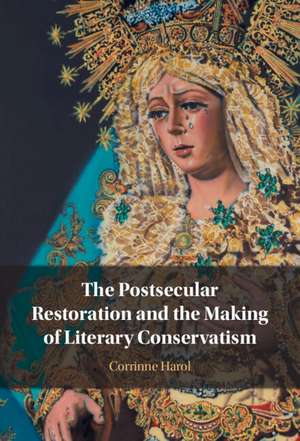The Postsecular Restoration and the Making of Literary Conservatism
Autor Corrinne Harolen Limba Engleză Hardback – 21 dec 2022
Preț: 574.23 lei
Preț vechi: 645.20 lei
-11% Nou
Puncte Express: 861
Preț estimativ în valută:
109.89€ • 114.49$ • 91.37£
109.89€ • 114.49$ • 91.37£
Carte tipărită la comandă
Livrare economică 10-24 februarie 25
Preluare comenzi: 021 569.72.76
Specificații
ISBN-13: 9781009273480
ISBN-10: 1009273485
Pagini: 252
Dimensiuni: 235 x 158 x 26 mm
Greutate: 0.56 kg
Editura: Cambridge University Press
Colecția Cambridge University Press
Locul publicării:Cambridge, United Kingdom
ISBN-10: 1009273485
Pagini: 252
Dimensiuni: 235 x 158 x 26 mm
Greutate: 0.56 kg
Editura: Cambridge University Press
Colecția Cambridge University Press
Locul publicării:Cambridge, United Kingdom
Cuprins
Part I. Political and Fictional Relations: 1. Faith: Impersonating Faith, or How We Came to Have Faith in Fiction; 2. Indulgence: The Stuart Declarations of Indulgence and their Afterlives. Part II: Postsecular Literary Experiences: Worlds and Time: 3. Figuring: Margaret Cavendish's Critique of Imagining and Worlding; 4. Reading: John Dryden's Postsecular Apostolic and the Time of Literary History. Part III: Political Agents and Novel Forms: 5. Passivity: The Passion of Oroonoko and the Ethics of Narration; 6. Revolution and Nostalgia: Walter Scott and the Forms of Jacobite Nostalgia. Coda: On Literary Conservatism as a Formal Category.
Recenzii
'Literary critics find it all too easy to equate formal innovation with a radical cast of mind. Corrinne Harol's provocative new study proposes that the very idea of literary form sprang up from underappreciated conservative roots. Harol traces the postsecular all the way back to the seventeenth-century development of secular liberalism, seeing the two modes as entangled from the outset. Whereas emerging secular thought prioritized abstract theory and aspired to universality, postsecular critique stressed local material practice. The result deftly gathered in this book's pages is a version of modern conservatism that not only arrives earlier than expected, fully a century before Edmund Burke's reaction to the French Revolution. It's also a conservatism that's decisively literary, marked (in the work of such counter-revolutionary innovators as Aphra Behn, John Dryden, and Margaret Cavendish) by a propensity to reshape given reality rather than to reinvent reality from scratch. This new strand of postsecular experimentation found its place outside of straightforwardly political and religious domains. The making of literary conservatism was to a surprising extent, Harol persuasively argues, the making of literature itself.' Dustin D. Stewart, Columbia University
Descriere
Corrinne Harol reveals how secularization catalysed conservative writers to respond and thereby contribute impactfully to literary history.
